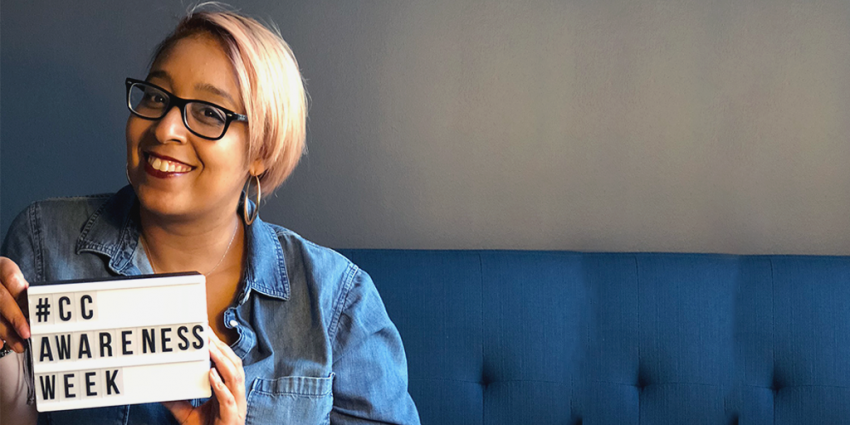This post was sponsored by AbbVie Inc. Personal opinions and thoughts are my own.
Crohn’s and Colitis Awareness Week is December 1-7. If you have Crohn’s disease or ulcerative colitis, get tips from gastroenterologist Dr. Corey Siegel, a Crohn’s disease and ulcerative colitis expert, by visiting the online Expert Advice Tool before your next trip to the doctor’s office.
I remember the day when I realized I was stuck in my disease and needed help. It was storming, and a flash of lightning captured my reflection in the window. I barely recognized myself as the tears rolled down my face, trailing one after the other. I felt trapped inside my own body and my home because of ulcerative colitis.
This was a time in my life when I should have been glowing; radiating absolute love and youth. New home, new baby, new city, new life. My little family had grown through miracles of miracles. Yet, my gratitude was suffocated by ulcerative colitis, which was stripping my body of nutrition, energy and hope. I was living day to day, moment to moment, without proper health care. I was unaware of any other treatment approaches outside of my regimen at the time. I didn’t know there were people out there living great lives with ulcerative colitis.
Ulcerative colitis is a chronic inflammatory bowel disease (IBD) characterized by inflammation of the gastrointestinal (GI) tract. It can affect the large intestine (rectum and colon), and is not contagious or caused by food.
There are approximately 700,000 people affected by ulcerative colitis. I had no idea that it was a progressive, chronic condition, which means it can continue to get worse over time if you are not proactively managing it. I didn’t know that I was simply putting a bandage over a gaping wound.
Then there was a doctor. A conversation. A solution. I had spent months in a city with one of the best IBD centers in the country, but I was afraid of rejection because of my insurance status. I found a program through my hospital that was created just for patients like me with chronic ailments who couldn’t get health insurance because of a pre-existing condition.
When I met with the doctor about my situation, he gave me a long list of treatment options and a suggested action plan. I was blown away…someone like me had options! The idea that I could get better and feel healthy again seemed so foreign. Closing my eyes, I thought about my son’s face and his voice. “Let’s do it!”
I find myself on the other side now. Treatments that work. Doctors who care. And information at my fingertips. The road here was long and I sometimes think about how different life would have been if I had found a doctor sooner and created a plan that fit my needs. I think of all the time wasted. I didn’t know what I didn’t know. Today, I am an educated patient and advocate. Sometimes I find myself being grateful for this experience. Grateful for IBD. Yes, you read that right, grateful. Gratitude.
IBD made me strong, resilient, and patient. It molded my parenting experience into something I may not have had as a television producer. I also recognized my inner strength. The strength I saw in other patients that I now use to inspire others each day through my blog and advocacy work.
If you have UC, work with your doctor sooner than later to create a monitoring and treatment plan focused on minimizing disease progression and your long-term success. Get tips from one of my favorites, gastroenterologist Dr. Corey Siegel, a Crohn’s disease and ulcerative colitis expert, by visiting the online Expert Advice Tool before your next trip to the doctor’s office.
(US-IMMG-180837)
Disclosure: This post was sponsored by AbbVie Inc., a biopharmaceutical company, and should not be construed to constitute medical advice. Personal opinions and thoughts are my own. I am not a medical professional and am not qualified to give medical advice. Please talk with your doctor about your individual medical situation.


